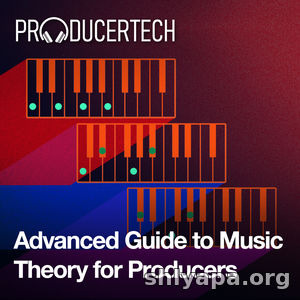Producertech Advanced Guide To Music Theory TUTORiAL

FANTASTiC | 1.21 GB
Following on from the success of the Beginner’s Guide to Music Theory for Producers, this Advanced Guide promises to expand your knowledge of music theory to greatly assist in the creation of more musical tracks. Whatever your level of music theory, there are tonnes of useful techniques and workflows for working both with a keyboard and purely in the DAW, all demonstrated in the production of various popular genres like Hip Hop, House, DnB and Trap.
The course begins with a summary of the Beginner’s Course, showing how to create melodic accompaniment and chords to go with a jazzy break, before moving onto the first advanced topic of modulation, meaning moving to a different key, starting off with the relative major and minor. There is also a thorough look at diatonic triad harmonies, covering the ways that triads change when shifted to different positions in the scale, and how this affects the mood of a song. A funky organ phrase is then put together with a House beat, which moves through a series of regular and inverted triads to create a catchy hook.
The next section shows how a track can move to a different key in a breakdown, and how the harmony and so rules for other melodic parts changes when doing so. There is also a focus on the circle of fifths relationship, showing how it connects all 12 chromatic tones, and the many different ways it’s been used to create popular music from the Baroque period right through to classic House!
After exploring a lush bassline, which is used as the basis for a Liquid DnB groove, there are a series of lessons that work through some of the more advanced chord types, including 7ths and 9ths, with both used to construct Hip Hop and Trap grooves, working mostly with the mouse. The course ends with a module on advanced scales, covering modes, pentatonic and chromatic, as well as a workflow for creating your own scale based purely on note selection in the piano roll.
In addition to all the streamed tutorials, signing up to the course provides access to a download pack containing all the projects, MIDI patterns and samples from the course, as well as a bonus assessment, for testing your newly acquired skills.
Module 1 - Basics Recap - Working with a Jazzy Break
Rob works through all of the subjects covered on the Beginner’s course by first analysing the melodic content in a bassline, to figure out the key of the track, and then showing many different examples of monophonic and polyphonic accompaniment to go with it.
Lesson 1 - Finding the Key - 9.59
Lesson 2 - Creating Melodic Accompaniment - 14.23
Module 2 - Related Major and Minor Keys
An intro to related keys, starting with the simplest, the relative major or minor. After explaining what it is, Rob shows how it works in a breakbeat track, demonstrating the changes that a melodic phrase needs to make in order to work with the new harmony. 10.43
Module 3 - Advanced Chords I - Working with Triads
This first chords module is a detailed exploration of the ways in which diatonic triads present themselves in a major and minor scale, providing a wealth of knowledge about which ones to use when creating triad chord progressions.
Lesson 1 - Minor Scale Triads - 8.38
Lesson 2 - Major Scale Triads & Roman Numerals - 8.58
Lesson 3 - Triad Chord Progressions in a Minor Key - 7.32
Lesson 4 - Triads following the Bass - 5.30
Module 4 - More Related Keys
Rob moves on to additional common keys to modulate to when producing, beginning with the dominant. This is shown in a number of examples, with one being the creation of a breakdown in a House track, and the others a range of compositions that utilise a ‘cycle of fifths’ technique.
Lesson 1 - The Dominant - 10.42
Lesson 2 - Circle of Fifths - 12.01
Module 5 - i-iv-VI Progression - Liquid DnB Groove
A guide to creating melodic content around a bassline, playing a i-iv-VI pattern of notes. Basslines and triads are recorded into a project and then edit, with an additional descending melody played in on top. 10.22
Module 6 - Advanced Chords II
This second chords module expands the palette further with richer and more interesting chords like 7th and 9ths, both of which are used to form chord progressions in grooves, with one played in and edited and the other drawn in entirely with the mouse.
Lesson 1 - 7ths/9ths/11ths/13ths - Major 7 Chill Trap Groove - 10.53
Lesson 2 - Minor 9 Hip Hop Groove - 9.53
Module 7 - Advanced Scales
Rob explains the principles that govern some of the most popular additional scales, beginning with a reminder of major and minor, before working through popular modes, chromatic, pentatonic and wholetone scales. He then shows an example workflow for choosing a scale based on note selection in the piano roll, then using that template as a basis for the harmony in a project, from which other melodic parts can be made.
Lesson 1 - Modes
Lesson 2 - Chromatic Scale and Accidentals
Lesson 3 - Scale Selection DAW Workflow
Outro
[ Report broken link!!! ]

Русские пользователи - используйте ВПН для скачивания!
Наши ссылки не работают для России и возможно каких-то других стран!
Russian users - use VPN to download!
Our links do not work for Russia and possibly some other countries!


|

